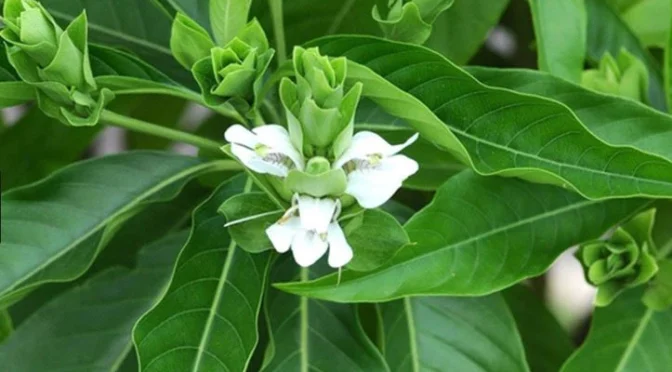
In the realm of Ayurveda, the ancient holistic system of medicine that originated in India, the utilization of medicinal plants for maintaining health and treating ailments has been a cornerstone practice. Among these revered botanical treasures, Adulsa, known scientifically as Vasaka (Adhatoda vasica), stands out as a potent remedy for respiratory disorders. With a history dating back thousands of years, Adulsa continues to be a cornerstone of Ayurvedic medicine due to its exceptional properties in supporting respiratory health.
Introduction to Adulsa (Vasaka): Adulsa, also referred to as Malabar Nut, is a shrub native to the Indian subcontinent and other parts of Southeast Asia. Its leaves, roots, flowers, and bark have been extensively utilized in Ayurveda for their therapeutic benefits. In Sanskrit, Adulsa is called “Vasa,” which aptly translates to “that which supports respiration.” This name underscores its central role in treating various respiratory conditions.
Ayurvedic Properties and Benefits: In Ayurveda, Adulsa is classified as bitter, astringent, and pungent in taste, with a cooling energy (virya) and a pungent post-digestive effect (vipaka). These qualities contribute to its ability to balance excess heat and inflammation in the body, making it particularly effective in addressing respiratory imbalances.
1. Respiratory Health Support: Adulsa is renowned for its exceptional efficacy in managing respiratory issues such as cough, bronchitis, asthma, and tuberculosis. Its bronchodilatory and expectorant properties help open up airways, alleviate congestion, and promote the expulsion of mucus, offering relief from respiratory discomfort.
2. Anti-Inflammatory Properties: The plant contains bioactive compounds like vasicine and vasicinone that possess potent anti-inflammatory effects. These compounds not only help soothe irritated respiratory passages but also contribute to overall systemic health.
3. Immune System Booster: Adulsa’s immune-modulating properties assist the body in effectively responding to infections and allergens that may trigger respiratory ailments. Regular consumption of Adulsa-based formulations may help strengthen the immune system’s defense mechanisms.
4. Anti-Bacterial and Anti-Viral Action: Adulsa’s natural antimicrobial properties aid in combating bacterial and viral infections that commonly affect the respiratory system. This makes it a valuable asset in preventing and managing respiratory infections.
5. Traditional Uses: Ayurveda prescribes Adulsa in various forms, including decoctions, syrups, and herbal formulations, to address a range of respiratory disorders. These formulations are often combined with other supportive herbs to create a synergistic effect.
6. Precautions and Considerations: While Adulsa is generally safe when used in moderation, pregnant and lactating women, as well as individuals with pre-existing medical conditions, should consult an Ayurvedic practitioner or healthcare professional before incorporating it into their regimen. Adulsa’s potency should be respected, and its use should be guided by Ayurvedic principles and individual constitution.
Embracing Adulsa in Modern Times: In a world where respiratory issues are becoming increasingly prevalent due to pollution, lifestyle factors, and seasonal changes, Adulsa’s age-old wisdom has not lost its relevance. As more people seek natural and holistic alternatives to conventional treatments, Ayurveda’s treasure trove of botanical remedies like Adulsa offers hope for better respiratory health and overall well-being.
In Conclusion: Adulsa, with its rich history in Ayurveda and its proven efficacy in supporting respiratory health, stands as a testament to the wisdom of traditional healing practices. As we continue to explore the synergy between ancient wisdom and modern science, Adulsa’s role as an Ayurvedic elixir for respiratory wellness remains steadfast, reminding us of the profound healing potential found in the embrace of nature’s gifts. However, it is always advised to consult an Ayurvedic practitioner before incorporating any herbal remedy into your routine, ensuring a holistic and personalized approach to well-being.
